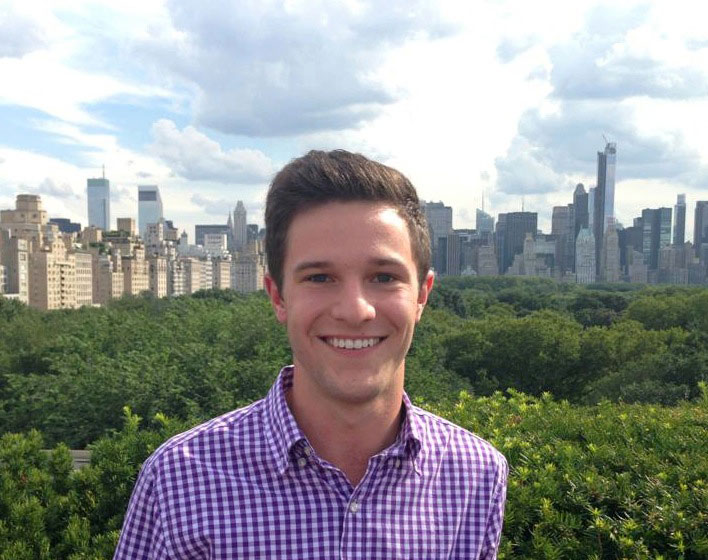A graduating senior, a PhD candidate and a recent alumnus—each with a vastly different focus—were selected as Fulbright Scholars for the upcoming year. Todd Norton will research probability in Germany, John Romey will study how street culture in Paris was adopted in theater, and Derek Schadel will teach English in Colombia.
The Fulbright Program is the flagship international educational exchange program sponsored by the U.S. government and supported by cooperating foreign governments around the world.
Todd Norton

A Case Western Reserve University senior who graduates this weekend with bachelor’s and master’s degrees in mathematics and physics won a Fulbright scholarship to research probability in Germany.
Thomas “Todd” Norton, 23, of Upper St. Clair, Pa., will study Feller processes, named for the Croatian-American mathematician and expert in probability, at the Technical University of Dresden.
Feller processes come under the umbrella of stochastic analysis, which, unlike standard modeling, can more accurately predict such things as population growth or weather, Norton explained.
“You can predict not only what a population will be a year from now, but also the probabilities the population will deviate from that prediction,” he said.
Norton will spend the year as a research assistant to Rene Schilling, a leading expert in probability and stochastic analysis, on an as-yet unnamed project.
The best-known Feller process is Brownian motion, used to model the random movement of molecules in a gas or the movement of stock prices on Wall Street. A process called Poisson counting can describe the arrival of hits on a favored Facebook page or customers at a local Walmart store, said Case Western Reserve’s Wojbor Woyczynski, professor of mathematics and Norton’s senior project adviser.
Woyczynski and Schilling co-authored a two-volume review of Feller processes, to be published later this year.
When he returns from Germany, Norton will enter the California Institute of Technology, where he’ll study mathematical physics.
John Romey

John Romey, a PhD candidate in historical musicology with an emphasis in historical performance, will spend the 2014-15 academic year in France as a Fulbright Research Scholar.
The fellowship provides Romey, originally from Baltimore, access to the vast archives at the Bibliothèque National de France and the Comédie Française, as well as other archives in and around Paris. He will be affiliated and work with the Centre de Musique Baroque de Versailles (Center for Baroque Music at Versailles).
The research will contribute to his dissertation: From the Street to the Stage: Popular Song and the Construction of Parisian Spectacle, 1680–1715.
As part of Romey’s doctoral program specializing in historical performance practices, he will reconstruct a play, complete with “divertissements,” or interludes of song and dance, at Case Western Reserve University.
He is exploring how street culture in Paris, particularly the popular cultural practice of setting new text to popular melodies, was adopted by the royally supported theaters, namely the Comédie-Française and Comédie-Italienne (the French theater of the commedia dell’arte). The subversive elements found in street texts was also adopted by the theaters, and gave rise to a competition between theaters to outdo one another, culminating in the banishment of the Comédie-Italienne by Louis XIV in 1697.
Romey’s research focus was inspired by a course assignment from his adviser and music professor Georgia Cowart. He was considering an interdisciplinary dissertation examining iconography of historical instruments and painting as a dissertation topic. But his direction changed when Cowart assigned him to read a play by the French Baroque playwright Florent Dancourt, Molière’s successor, who wrote some of the first opera parodies for the French theater.
The Fulbright Research Scholars program in France provides a stipend that enables Romey’s wife, Monica Benavente-Romey, to accompany him. The couple is looking forward to visiting friends in Europe along with the intensive research the fellowship allows.
Derek Schadel

Derek Schadel, who graduated from Case Western Reserve in January with a degree in anthropology and Spanish and a minor in math, will spend 10 months in Medellín, Colombia, on a Fulbright English Teaching Assistantship.
The opportunity affords the Findlay, Ohio, native a chance to combine his love of cultures and language, and maybe even spend free time honing another interest: salsa dancing.
His Fulbright adventure, which begins July 20 with orientation and continues until May, actually marks a bit of a homecoming.
Schadel first visited Colombia at age 19, a trip inspired by his aunt, Angela, a Colombian native who married into the family when he was 13. She was the first person he’d ever met who spoke Spanish as a first language.
He said he’s been obsessed with the South American country and its culture ever since, and considers her a mentor for encouraging his interest.
The visit to Colombia, and two summers spent volunteering for nonprofit youth leadership program Amigos de las Américas—first as a volunteer in rural Mexico and then the following summer as a project supervisor in Paraguay—only made him want to spend more time in Latin America.
“I was completely fascinated,” said Schadel, who also spent a semester studying in Madrid. “I have thrived in these experiences abroad by not only learning about new cultures, but immersing myself and really experiencing them.”
Schadel hopes the Fulbright opportunity allows him to develop into a more “global citizen,” while also becoming even more fluent in Spanish.
“Learning a second language has opened many doors for me,” he said.
While at Case Western Reserve, he used his fluency in Spanish to volunteer for El Barrio, a workforce-training center on Cleveland’s west side, where he taught English as a second language to adults. The experience was part of his SAGES capstone project.
And since graduation, Schadel already has put his Spanish-speaking skills to work in New York City, helping people from diverse backgrounds navigate the welfare system. Working as a public benefits coordinator with the non-profit NYC Financial Network Action Consortium, Schadel has provided direct service to hundreds of New Yorkers and managed a team that has screened more than 800 people for the Supplemental Nutrition Assistance Program, formerly the Food Stamp program.
